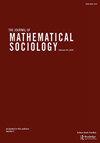Sociophysics of income distributions modeled by deformed fermi-dirac distributions
IF 0.7
4区 社会学
Q3 MATHEMATICS, INTERDISCIPLINARY APPLICATIONS
引用次数: 0
Abstract
ABSTRACT In order to model the income data, the physical distributions of Fermi-Dirac and Bose-Einstein families have already been proposed in the literature. In this study, we generalize Fermi-Dirac distribution by using a q,p-deformed version of Fermi-Dirac distribution which provides the advantage of working with flexible free q, p deformation parameters as the regression parameters for modeling the income data. We analyze the accuracy of the generalized version, q,p-deformed Fermi-Dirac distribution, on describing the data of income share held by quintiles for countries, and household income for the states of U.S.A. in 2018. We also use minimization routine for modeling the data which leads to the best fit parameters for the deformation parameters q and p. Subsequently, we plot the fitted q,p-deformed Fermi-Dirac distribution as income distribution with the obtained deformation parameters, then find the statistical confidence values from the fitted curve. We figure out that our model properly describes the income data for the systems experiencing a high level of income inequality, and also values are correlated with the Gini index for those of considered systems.以变形费米-狄拉克分布为模型的收入分配的社会物理学
摘要为了对收入数据进行建模,文献中已经提出了费米-狄拉克和玻色-爱因斯坦家族的物理分布。在这项研究中,我们通过使用费米-狄拉克分布的q,p变形版本来推广费米-狄ac分布,该版本提供了使用灵活的自由q,p形变参数作为对收入数据建模的回归参数的优点。我们分析了广义版本q,p变形费米-迪拉克分布在描述2018年各国五分位数收入份额和美国各州家庭收入数据方面的准确性。我们还使用最小化程序对数据进行建模,从而得出变形参数q和p的最佳拟合参数。随后,我们用获得的变形参数将拟合的q,p变形费米-狄拉克分布绘制为收入分布,然后从拟合曲线中找到统计置信度值。我们发现,我们的模型正确地描述了经历高度收入不平等的系统的收入数据,并且所考虑的系统的值与基尼指数相关。
本文章由计算机程序翻译,如有差异,请以英文原文为准。
求助全文
约1分钟内获得全文
求助全文
来源期刊

Journal of Mathematical Sociology
数学-数学跨学科应用
CiteScore
2.90
自引率
10.00%
发文量
5
审稿时长
>12 weeks
期刊介绍:
The goal of the Journal of Mathematical Sociology is to publish models and mathematical techniques that would likely be useful to professional sociologists. The Journal also welcomes papers of mutual interest to social scientists and other social and behavioral scientists, as well as papers by non-social scientists that may encourage fruitful connections between sociology and other disciplines. Reviews of new or developing areas of mathematics and mathematical modeling that may have significant applications in sociology will also be considered.
The Journal of Mathematical Sociology is published in association with the International Network for Social Network Analysis, the Japanese Association for Mathematical Sociology, the Mathematical Sociology Section of the American Sociological Association, and the Methodology Section of the American Sociological Association.
 求助内容:
求助内容: 应助结果提醒方式:
应助结果提醒方式:


